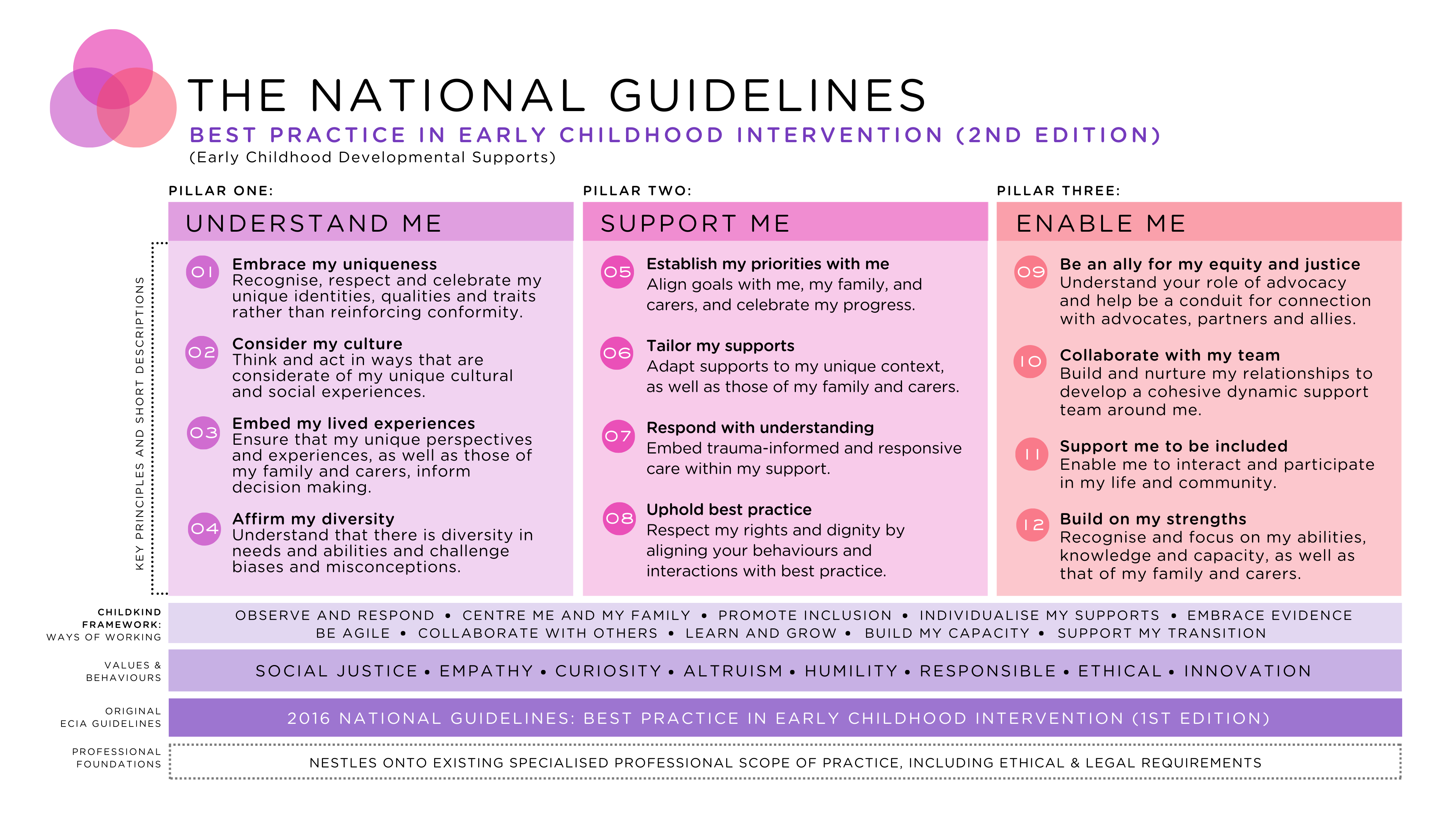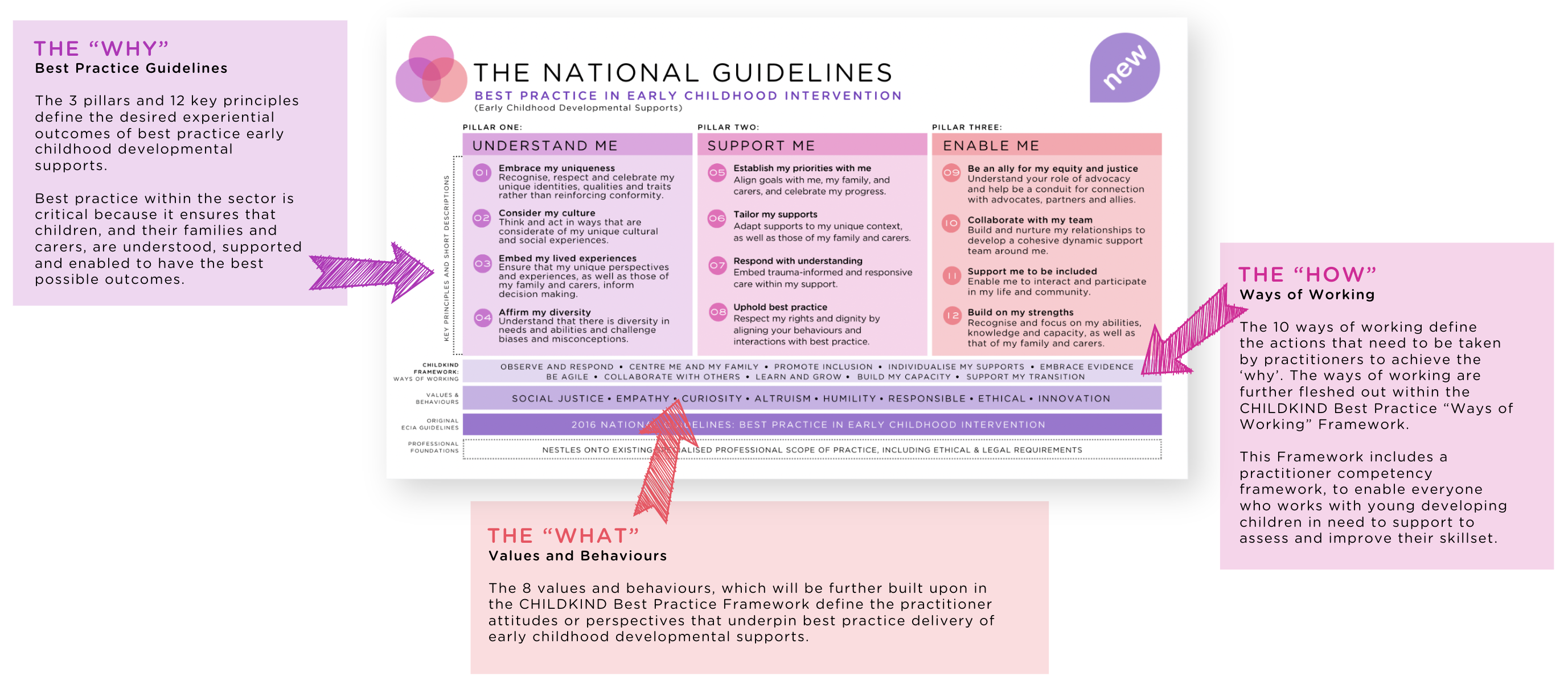
THE NATIONAL GUIDELINES FOR BEST PRACTICE IN EARLY CHILDHOOD INTERVENTION (SECOND EDITION)
Our updated National Guidelines are supported by three new best practice pillars – Understand Me, Support Me and Enable Me. These pillars are breathed-to-life by 12 best practices and supported by our comprehensive and action-oriented ChildKind Best Practice Framework.
The development of the Best Practice Guidelines for Early Childhood Intervention (2nd Edition) represents the culmination of almost ten years work, including six years of extensive co-design work, deeply rooted in collaboration with families of young children (aged 0-8) with disability, developmental delay, and neurodivergence, and the practitioners who support them.
The new National Guidelines for Best Practice in Early Childhood Intervention (2nd Edition) have been developed to support all families of young developing children, with a particular focus on those children who have disability, developmental delay, or neurodivergence. They offer a fresh and evolved approach to supporting young children and their families.
The new Guidelines have been designed to provide clear, actionable insights and strategies that families can utilise to ensure their children receive the highest quality care and support during their critical early years.
These Guidelines build upon the first edition of the National Guidelines and represent many years of co-design work with families and practitioners and embody an inclusive, evidence-based approach that sets a new standard in early childhood intervention.
The new Guidelines are structured around three key pillars: Understand Me, Support Me, and Enable Me.

Each of the three best practice pillars provides a foundational framework for delivering best practice care, focusing on understanding the unique needs of each child, providing the right supports, and enabling them to thrive within their environments. These pillars align with the holistic, family-centred philosophy that must underpin all early childhood developmental supports, ensuring that children, and their families, are treated with respect, care, and individualised attention.
Supporting the pillars are the 10 Ways of Working and 30 Key Competencies, which form the basis of the new ChildKind Best Practice Framework and provide a practical approach for practitioners to apply best practice within their everyday practice. These are complemented by 8 core Values and Behaviours, which emphasise the importance of respect, inclusion, and collaboration in working with young children and their families.
EXPLORE THE THREE PILLARS OF BEST PRACTICE
The definition above was co-designed by parents and carers of children with disability, developmental delay, and neurodivergence, and the practitioners who support them, during a series of Best Practice co-design workshops held from April to July 2024.
Early Childhood Developmental Supports (also known as Early Childhood Intervention or ECI) refers to the supports and services that a child, and their family and carers, receive and participate in within the first eight years of the child’s life. These services aim to promote the:
When Early Childhood Developmental Supports are delivered well, the supports and services will work to understand, support and enable the child and their family and carers.
Recognise, respect and celebrate my unique identities, qualities and traits rather than reinforcing conformity.
Ensure that my unique perspectives and experiences, as well as those of my family and carers, inform decision making.
Think and act in ways that are considerate of my unique cultural and social experiences.
Understand that there is diversity in needs and abilities and challenge biases and misconceptions.
Align goals with me, my family, and carers, and celebrate my progress.
Embed trauma-informed and responsive care within my support.
Adapt supports to my unique context, as well as those of my family and carers.
Respect my rights and dignity by aligning your behaviours and interactions with best practice.
Understand your role of advocacy and help be a conduit for connection with advocates, partners and allies.
Enable me to interact and participate in my life and community.
Build and nurture my relationships to develop a cohesive dynamic support team around me.
Recognise and focus on my abilities, knowledge and capacity, as well as that of my family and carers.
Explore the 10 ChildKind Ways of Working and explore the 8 Values and Behaviours:

The Why How What model, also known as the Golden Circle Theory, proved to be an ideal tool for conceptually reframing the national guidelines, and clearly aligning best practices with actionable strategies and values.
By defining their purpose (WHY); outlining the methods to achieve that purpose (HOW); and detailing the specific actions or standards to be followed (WHAT). The WHY focuses on the critical importance of best practice guidelines, ensuring children and families achieve optimal outcomes.
The HOW provides clear, actionable ways of working, guiding practitioners to deliver these outcomes effectively. The WHAT defines the values and behaviours that underpin best practice, ensuring consistency and integrity in service delivery. This structured approach ensures that all aspects of guidelines are aligned for maximum impact.
Background:
This work has been guided by Reimagine Australia’s unwavering commitment to best practice, ensuring that every step of the new guidance reflects the lived experiences and needs of those at the heart of the early childhood developmental supports sector. The 2024 updated guidance has been informed by our exhaustive body of work since the publication of the first edition of the National Guidelines in 2016. Every conversation, consultation, workshop, round table, or survey that we have engaged in for almost a decade always came back to one single core topic – best practice.
The foundations for the updated guidelines was laid through various large-scale bodies of work including the Reimagine Early Childhood National Action Plan to 2030, commissioned by the Australian Government in 2018. This extensive project involved 130 interviews with 347 participants, who represented a broad spectrum of stakeholders, including families and caregivers from diverse backgrounds, service providers, government departments, educational settings, and NDIS Early Childhood Partners.
The insights gathered during this period were instrumental in shaping the strategic direction of Reimagine’s work in revising the guidance for early childhood developmental supports (intervention) in Australia, setting the stage for the additional guidance and tools that have been delivered .
Building on this foundation, the 2023 Best Practice White Paper, independently led by the University of Sydney and partnered by Reimagine Australia, further refined our understanding of best practice in early childhood intervention. Through 14 focus group sessions, five individual interviews, and an interactive forum at the Reimagine 2023 National Conference, we gathered the perspectives of 147 participants, including families, allied health practitioners, educators, and community service organisations. The White Paper was supported by a National Taskforce of 14 peak or representative organisations, ensuring that the recommendations were grounded in the contemporary evidence and sector-wide consensus.
From 2021 to 2024, Reimagine Australia undertook a series of targeted co-design activities. all centred around best practice to ground this work. 55 Reports, Frameworks, Strategies and Standards were reviewed. Through 62 interviews, 16 co-design workshops extensive and comprehensive insights, ideation and solutions insights were gathered and synthesised into key themes. We engaged with a diverse range of participants, including primary caregivers, families, healthcare practitioners, paediatric specialists, educators, and NDIS support workers. The outcomes of this work provided the essential building blocks for the new guidelines
Unlike traditional frameworks that often segregate or “other” children with disability, developmental delay, and neurodivergence, our new guidelines are universally inclusive, designed to support all young developing children within a single, cohesive framework. This approach ensures that best practice is not an isolated concept but a universally applicable standard that every practitioner, regardless of their role or the setting in which they work, can understand and implement.
Through this rigorous and collaborative process, we have created guidelines that are not only theoretically sound but also practical and actionable. They are written in clear, easy-to-understand language, ensuring accessibility for all stakeholders, from families to practitioners. The co-design process ensured that our updated guidance is grounded in the real-world experiences of those who will use and benefit from it, and will ultimately drive excellence in early childhood developmental supports (intervention) across Australia.
It is intended that the new guidance is a living framework that can easily be iterated and updated, as and when it is required.